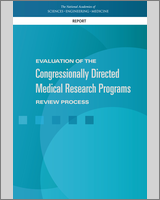There's an overview of the CDMRP here:
https://www.ncbi.nlm.nih.gov/books/NBK424509/#sec_000011
It seems to be a program by which Congress funds the Department of Defense to manage various medical research programs which are contracted to outside research groups. Some of this is closely related to the military, such as the study of Gulf War Illness (Nancy Klimas has received CDMRP grants), but other programs - which I assume are also contracted by the DoD - do not have a specific connection to the military other than that military members (
and their families) are as affected as is the general public.
CDMRP views itself as a leader in advancing medical and scientific research and filling research gaps “by funding high impact, high risk and high gain projects that other agencies may not venture to fund” (
cdmrp.army.mil). It emphasizes that its 29 research programs (see
Box S-2) and the projects they fund must be relevant to the health of members of the military
and their families. Each research program has its own specific vision and mission statement.
So it seems to be, in part, a sort of a mechanism by which Congress can direct money towards research into specific illnesses on the grounds that these illnesses affect military members
and their families. I guess the only illnesses which would be excluded under that criteria would be... none.
[ I don't think it would be necessary, but, if you're going to include a personal note, it might be useful to mention it if you or your family has any connection to the U.S. military. ]
Here are the programs they were funding in 2016:
BOX S-22016 CDMRP Research Programs
- Alcohol and Substance Abuse
- Amyotrophic Lateral Sclerosis
- Autism
- Bone Marrow Failure
- Breast Cancer
- Defense Medical Research and Development*
- Duchenne Muscular Dystrophy
- Epilepsy
- Gulf War Illness
- Joint Warfighter Medical*
- Lung Cancer
- Military Burn
- Multiple Sclerosis
- Neurofibromatosis
- Orthotics and Prosthetics Outcomes
- Ovarian Cancer
- Parkinson's Research
- Peer Reviewed Alzheimer's
- Peer Reviewed Cancer (13 topics)
- Peer Reviewed Medical (39 topics)
- Peer Reviewed Orthopaedic
- Prostate Cancer
- Psychological Health & Traumatic Brain Injury*
- Reconstructive Transplant
- Spinal Cord Injury
- Tick-Borne Disease
- Trauma Clinical Research
- Tuberous Sclerosis Complex
- Vision
*
Managed on behalf of the DoD Defense Health Agency.
SOURCE:
CDMRP, 2015f.
From:
Summary

Evaluation of the Congressionally Directed Medical Research Programs Review Process.
National Academies of Sciences, Engineering, and Medicine; Health and Medicine Division; Board on the Health of Select Populations; Committee on the Evaluation of Research Management by DoD Congressionally Directed Medical Research Programs (CDMRP).
Washington (DC):
National Academies Press (US); 2016 Dec 19.
Copyright 2016 by the National Academy of Sciences. All rights reserved.
NCBI Bookshelf. A service of the National Library of Medicine, National Institutes of Health.

